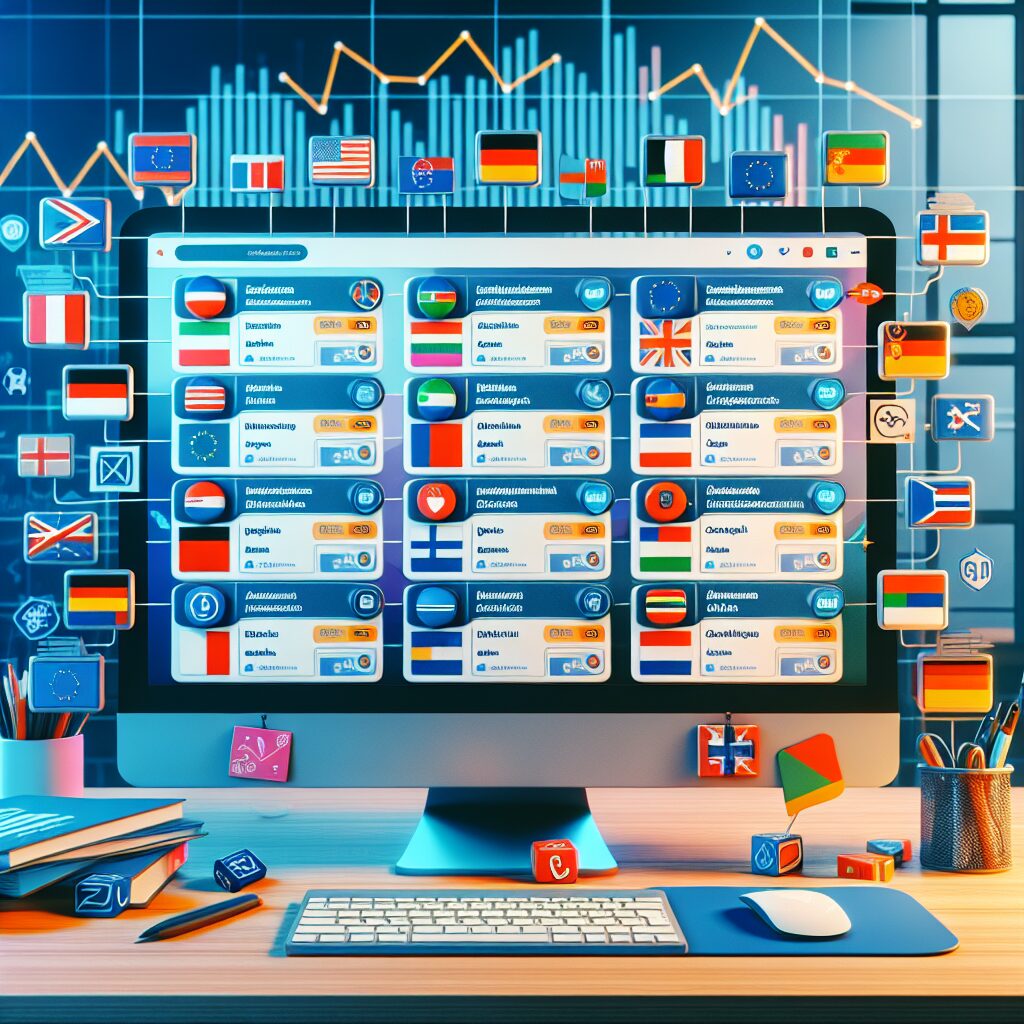About eldris
At Eldris, we automate SEO, multilingual site expansion, and EU compliance for brands scaling across Europe. Our AI-powered platform handles everything from content publishing to regulatory docs—so you don’t have to.
In This Article
- International SEO aligns regional reach with search engine best practices and legal frameworks.
- Localisation adds cultural nuance, while translation simply changes language.
- Eldris automates essential workflows—including hreflang, metadata, and legal compliance.
- Proper site structures, like subdirectories or ccTLDs, impact global rankings significantly.
- Complying with global regulations like GDPR, CCPA and LGPD is crucial for sustainable SEO.
- Eldris enhances cross-engine optimisation for Google, Baidu, and Yandex.
- Case studies prove dramatic traffic increases and cost savings using automated SEO management.
Understanding International SEO Compliance
Why Regulatory Compliance Matters
International SEO is more than simply translating content; it’s about ensuring visibility and compliance on a global scale. As organisations expand globally, they face a web of legal and regulatory requirements in each region. Adhering to these standards—ranging from the GDPR in Europe to the CCPA in California—protects enterprises from steep fines and costly data breaches while enhancing user trust. These laws govern data collection, storage, and processing, and search engines are increasingly weighing site compliance when determining rankings.
Moreover, with Google’s evolving algorithm placing significant emphasis on user experience and data privacy, non-compliance can negatively affect crawlability and domain authority. Ignoring these obligations doesn’t just risk legal action; it impacts your brand’s ability to compete internationally. International SEO compliance ensures your digital presence aligns with diverse jurisdictional standards, which translates into better rankings, increased traffic, and sustainable expansion.

Challenges of Multilingual SEO
Localization vs. Translation
One of the most critical challenges in international SEO is understanding the difference between localisation and translation. While translation involves converting content from one language to another, localisation goes several steps further. It adapts content to reflect local culture, idioms, user preferences, currency, date formats and even regional laws. Simply translating keywords or meta descriptions won’t suffice when you aim for organic visibility across countries.
For instance, a website targeting Spanish-speaking users in Mexico must differ from one aimed at audiences in Spain—even though both countries speak Spanish. The linguistic nuances and buying preferences vary significantly. International SEO fails when localisation is treated as an afterthought. This is where tools like Eldris shine. They allow SEO professionals to automate language grids while preserving cultural currency, idiomatic accuracy, and legal compliance—ensuring that every regionally targeted page resonates with its audience.
How Eldris Automates Global SEO Workflows
Technical Integration with Eldris
Eldris is engineered for seamless integration into varied Content Management Systems (CMS), whether you’re using WordPress, Drupal or enterprise-grade platforms like Adobe Experience Manager. Once integrated, Eldris synchronises real-time performance metrics, multilingual keyword databases, canonical tagging, and structured URL logic under one dashboard. More importantly, it provides AI-driven suggestions for optimisation based on geotargeted behaviours, helping eliminate common manual errors across multilingual SEO efforts.
Through automated schema markup insertion, Eldris boosts search engine comprehension for multiple regions. It also flexibly integrates with language detection APIs, allowing dynamic redirection based on user location and preference—without hampering site speed. This elevates both technical and content SEO components. With Eldris, global SEO professionals no longer have to manage localisation workflows manually, as the system anticipates indexation hurdles and offers remediation strategies instantly.
Implementing GDPR Across Borders
Compliance Tactics You Shouldn’t Ignore
GDPR, or General Data Protection Regulation, imposes strict guidelines on data collection, processing and storage, particularly for organisations interacting with European users. For international SEO, this means adjusting cookie banners, opt-in mechanisms, data-retention policies, and server hosting protocols. Even companies based outside the EU must comply if they attract or serve EU-based traffic. With Eldris, automated GDPR modules check for cookie consent framework compatibility, local data replications and third-party plugin compliance.
Moreover, the platform supports multilingual privacy policies dynamically linked to individual country pages. Eldris also encourages mobile-first design compatibility with privacy compliance—ensuring faster load speeds and complete transparency for users. At a time when SEO penalisation over data security lapses is growing, automation of GDPR compliance with Eldris can provide a competitive edge. Adopting these tactics ensures both user trust and search visibility aren’t compromised.
Core SEO Automation Tools in Eldris
What Gets Automated?
International SEO campaigns involve hundreds of moving parts. Eldris automates key segments such as hreflang implementation, local citation management, language-specific XML sitemaps, and country-specific canonicalisation. This addresses one of the most prevalent pitfalls in global campaigns: misconfiguration of country and language targeting. Eldris’s AI analyses regional traffic patterns and recommends meta changes, content updates and newly trending keywords in multiple languages, removing the guesswork from campaign management.
Additionally, the tool automates duplicate content checks across multiple domains or subdirectories, ensuring that site authority isn’t diluted. AMP support, mobile-first indexing compliance, and structured data injection across all local variants are made fully automatic. This depth of automation minimizes human error and accelerates time-to-market for new country rollouts. For businesses scaling simultaneously across markets, these time savings and risk reductions are invaluable.
Website Structuring for International Reach
hreflang, URLs & Directory Best Practices
The structural foundation of any international SEO strategy must be resilient, scalable, and clear to search engine crawlers. Best practices demand the use of hreflang tags to signal language and regional targeting precisely. Eldris automates correct hreflang logic including x-default attributes, resolving frequent misalignment issues found in manually coded website headers or HTML templates.
Deciding between ccTLDs, subdomains or subdirectories also significantly impacts region-specific ranking. For instance, ccTLDs like “.de” denote country-specific relevance which often performs better in local SERPs. Eldris provides heatmaps and traffic predictions for each structural variation, enabling data-driven decisions. It also preserves internal link equity across multilingual pages, ensuring no PageRank is lost during localisation. More on this setup can be found at Learn more about International SEO Compliance.
International Search Engine Optimization Techniques
Targeting Google, Baidu, and Yandex
Different countries favour different search engines, and international SEO demands an understanding of these platforms beyond Google. For China, Baidu dominates. For Russia, it’s Yandex. These engines have unique webmaster tools, ranking algorithms and content preferences. Baidu, for instance, prefers websites hosted on Chinese servers and prioritises simplified Chinese written in vertical information hierarchy. Eldris incorporates Baidu-specific validation and page crawling protocols to optimise accordingly.
Similarly, Yandex places considerable emphasis on behavioural factors and local trust indicators. Eldris accounts for socio-cultural business validation, integrating direct feedback loops from Yandex Webmasters. These tools help you build sectoral authority and content visibility with search engines other than Google, giving you better access to niche markets. A balanced International SEO strategy doesn’t silo itself exclusively to Google optimisation, and Eldris helps you navigate this diversity effectively using automated best practices.
Legal Considerations Per Region
GDPR, CCPA and Beyond
The international regulatory landscape is fragmented and constantly evolving. Besides GDPR in the EU, enterprises must also consider the California Consumer Privacy Act (CCPA), Brazil’s LGPD, and emerging regulations such as India’s Digital Personal Data Protection Bill. Each of these affects how data forms can be embedded, how consent is captured, and even what cookies may be used during site visits.
Eldris offers pre-configured templates for compliance banner deployment, form scripts, and third-party plug-in evaluations. These templates are region-aware and update automatically as legislation changes. The system also enables A/B testing for compliance messages, letting businesses iterate impactful messaging without compromising legality. Eldris’ compliance updates are synchronised in real time via encrypted notification protocols, helping you avoid regulatory whiplash and retain your competitive standing globally.
Why Content Localization Impacts SEO Rankings
Using Eldris for Dynamic Content Delivery
Search engines prefer fresh, relevant, and localised content. Properly localised content doesn’t just match language—it aligns with cultural trends, legal tone, and regional buying behaviour. Eldris enables dynamic content adaptation whereby entire landing pages adjust based on user IP, browser language and referring domain. Unlike static templates, this setup delivers substantially higher engagement and lower bounce rates due to increased relevancy.
Moreover, Eldris ensures meta data and Open Graph attributes are also localised, enhancing visibility in social search avenues. This level of granularity aids not just ranking but conversion. Eldris even uses geolinguistic A/B tests to assess which content performs better in-market, raising International SEO performance across every territory. For practical guidance, consider Read a related article.
Case Study: Eldris Clients Scaling Globally
Success Stories of Automated International SEO
One prominent Eldris client, a global B2C e-commerce brand, expanded from four to 28 countries in 16 months. Using Eldris, they automated local keyword integration, regional meta updates, and systemic hreflang rollouts, all without recruiting additional personnel. Organic traffic rose 340% year-over-year across new markets, while bounce rates fell by 27% due to improved content localisation.
Another success involved a SaaS company entering Latin America. Eldris synchronised their site across four Spanish dialects, improved compliance banner interactions, and connected CRM plugins for regional tracking. Conversion rates doubled within three months. These success stories exemplify how Eldris transforms International SEO campaigns into data-driven global growth hubs. For further reading, visit Explore the latest technical SEO program insights.
Conclusion and Next Steps
Implementing a robust, scalable, and compliant International SEO strategy is no longer optional for brands aiming for global traction—it’s essential. From automated localisation and hreflang controls to regulatory compliance and search engine diversification, Eldris empowers digital marketers to orchestrate intricate campaigns with confidence. What used to be slow and error-prone has become fast and intuitive using Eldris automation.
As global regulations evolve and competition intensifies, organisations that embrace integrated platforms like Eldris will maintain visibility, avoid penalties, and resonate with diverse audiences. Your next step? Evaluate your international SEO landscape today and deploy a solution tailored for cross-border success. The digital world waits for no one—position your brand as a leader, not a laggard.
“Eldris allowed us to go live in 14 countries without compromising compliance or content quality.” — Global SEO Manager, RetailCorp
Great guide on the-comprehensive-eldris-guide-to-international-seo-compliance-interactive – Community Feedback
What is international SEO compliance?
International SEO compliance ensures that your website meets all legal and technical requirements across different countries, including data privacy regulations like GDPR.
How does Eldris help with SEO automation?
Eldris automates key aspects of SEO, such as multi-language optimization and regulatory compliance checks, to streamline global expansion.
Why is GDPR important for international SEO?
GDPR compliance protects user data and avoids legal penalties, which is crucial when managing websites targeting European audiences.
Can automation improve multilingual SEO?
Yes, automation tools like Eldris ensure linguistic consistency and quick updates across all site versions, enhancing international SEO performance.








